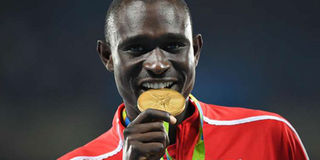Corrupt sports officials letting down our hard-working athletes

Runner David Rudisha celebrates on the podium for the men's 800m in the athletics event during the 2016 Summer Olympics at the Olympic Stadium in Rio de Janeiro in Brazil on August 16, 2016. PHOTO | JOHANNES EISELE | AFP
What you need to know:
Sport is one of the few issues that bring us together as a nation.
We have no tribes when we cheer our runners, jumpers and throwers.
We are all revelling and celebrating the successes of our athletes in Rio. And as we do so, we should always remember that it has taken blood, sweat and tears for every woman and man who wins a medal, or even participates. We should congratulate our athletes even more because they achieve so much not because of the support from our authorities, but in spite of them.
Sport is one of a few issues that bring us together as a nation. We have no tribes when we cheer our runners, jumpers and throwers. And we forget our political divide as we cherish Collins Injera as the person who has scored the most tries in world sevens rugby, and marvel at his relationship with his brother and rugby colleague Humphrey Kayange. We salute our Harambee Stars when they win and mourn loudly when they lose.
Our mourning is the more painful because we know that our young sportswomen and men can do better if given a fair chance.
If there were less corruption by football officials (and that is a long story), and by athletics officials, some of whom were quasi-permanent officials until international intervention forced them to leave office. And think again if you imagine they stayed in office for all those decades because of their devotion to “service!”
These have been some painful few years for our athletes as reports of doping and corruption have flowed.
The fact that officials kept being “re-elected” time and again speaks volumes about the mess in the system. And that included how they dealt with our most promising young runners. It is the reason why so many have changed nationality and wear the colours of other nations.
Yes, some of the change of nationality is because of money – which is okay – but a large part is because of the ill-treatment, extortion and corruption in athletics.
OFFICIALS' CRONIES
The tribulation suffered by Julius Yego as the team left for Rio is symptomatic. Officials are far more concerned about themselves and their cronies than the athletes.
It is a wonder that Boniface Mucheru could win a silver medal given how sprints coach John Anzrah was treated.
Thus when Ruth Jebet decides to run for Bahrain, we should not be so quick to condemn her. Nor should we rush to suggest that money is the sole reason for her decision to change nationalities. But even if her motivation was to make money, why is that a problem in a country that promotes laissez faire capitalism? Why should we judge her when we celebrate the crooked corrupt and drug dealers, often electing them to office for handouts? At least Ms Jebet’s wealth is from her sweat and hard work!
Sometimes the easiest way for a young upcoming athlete to get a fair chance is to change nationalities. It is much easier when one is a David Rudisha, Ezekiel Kemboi or Vivian Cheruiyot who have enough cache and importance to deter interference from officials. But the journey to becoming one of the great ones can be frustrating and demeaning.
Over the years, I have met enough athletes who were born in Kenya but chose to run for Bahrain or Qatar. Their reason was simple: in these countries, promises were kept, there was no extortion and the officials treated them with respect, rather than as cash cows.
On the doping, again we should not be surprised that it has been happening, and probably for a while, too, despite our vast natural talent. First corruption in Kenya is so endemic that no sector is immune from it. It creates impunity and we can expect little to no effective domestic oversight. Whatever oversight exists can always be bought off.
Second, the shelf life of athletes is very short. They have about 10 years of active working life to not only make enough to survive as they compete, but also make enough to invest and sustain them or the rest of their lives when they have stopped competing at about the age of 30. So are we surprised if athletes take performance enhancement drugs that work and thus increase income, in a context where local authorities turn a blind eye with kitu kidogo?





